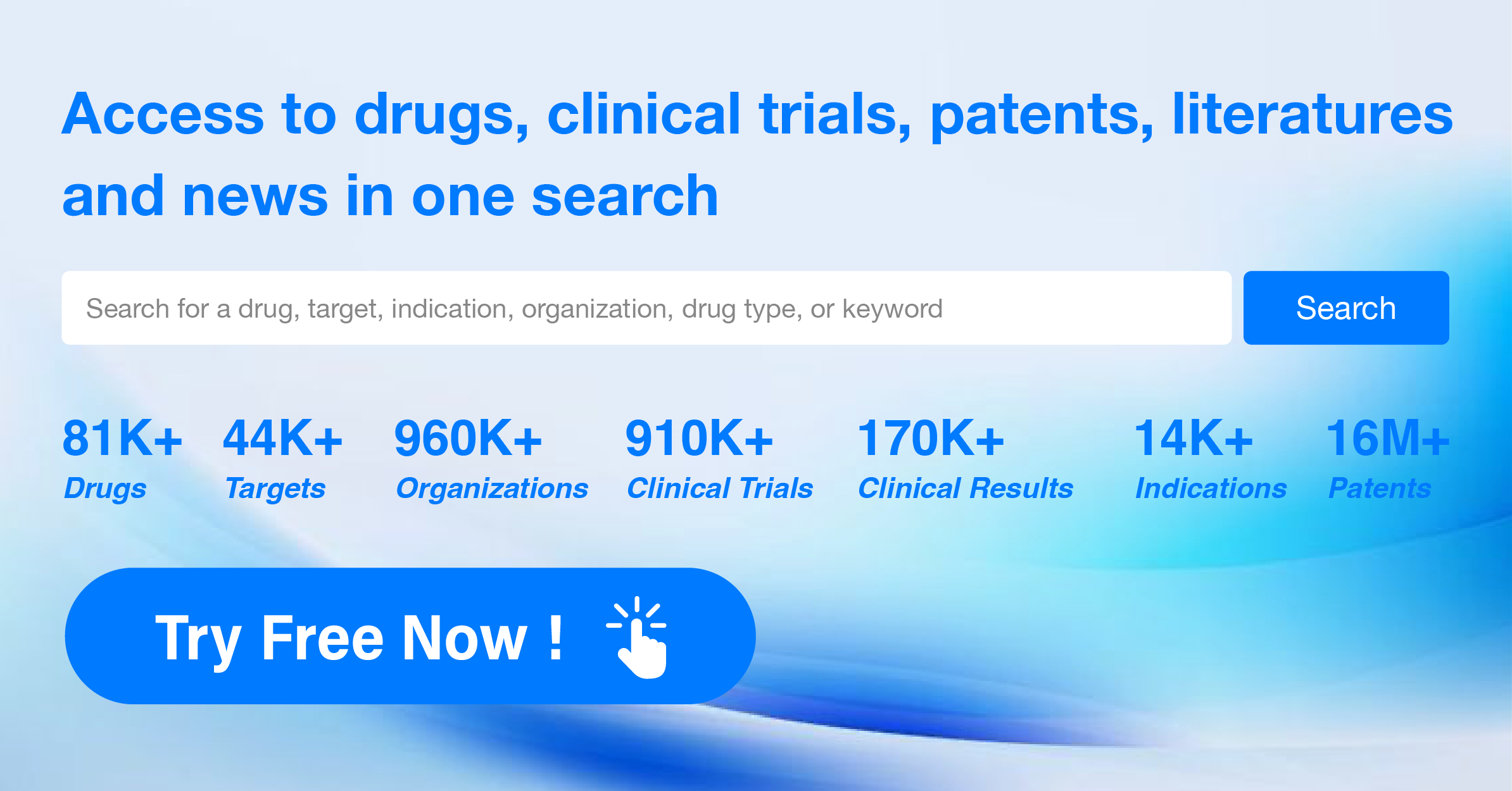Pharma Frontiers: Daily Digest of Global Pharmaceutical News - May 8
1.Inmagene Announces Positive Interim Results from Phase 2a Study of Innovative Atopic Dermatitis Drug IMG-007
On May 7th, Inmagene announced that its clinical phase 2a study of IMG-007 in patients with atopic dermatitis (AD) has produced positive interim results. IMG-007 is a clinical-stage, non-depleting anti-OX40 monoclonal antibody, which has demonstrated rapid, significant, and sustained improvement in the skin symptoms of AD patients. This antibody has been bioengineered to eliminate antibody-dependent cell-mediated cytotoxicity (ADCC) effects, while also extending its half-life. Previously, a single-dose escalation study in healthy subjects indicated that IMG-007 has good safety and tolerability profiles, with no subjects reporting fever or chills, consistent with the elimination of ADCC effects. Furthermore, IMG-007 exhibited a low drug clearance rate and an approximate 31-day half-life at the anticipated therapeutic dose level, potentially allowing for a dosing frequency of once every 12 weeks (Q12W) during AD induction therapy, with even lower frequencies possible during maintenance phases.
The positively concluded phase 2a study evaluated the safety, pharmacokinetics, and efficacy of IMG-007 in adult patients with moderate to severe atopic dermatitis who were poorly controlled by and/or intolerant to topical medications. Patients who had previously received systemic treatments, such as biologics, were also included in the study. Key endpoints of the study included safety and the percentage change from baseline over time in the Eczema Area and Severity Index (EASI). After treatment with IMG-007, EASI scores showed rapid and notable improvement from baseline as early as the first week, and continued improvements were observed at the end of week four and thereafter. The average percentage improvements in EASI scores from baseline at weeks 1, 2, 4, 8, 12, 16, and 20 were 23%, 29%, 47%, 66%, 68%, 77%, and 87%, respectively.
2.Argo Biopharma's siRNA new drug completes dosing in first patient of Phase II clinical trial
On May 7th, Argo Biopharma announced that the first participant was dosed on April 29, 2024, in the Phase 2 clinical trial of BW-01, which targets severe hypertriglyceridemia. BW-01 is an siRNA (small interfering RNA) cardiovascular drug independently developed by Argo Biopharma. siRNA drugs have emerged in recent years as a leading new class of medicinal technology, offering multiple advantages such as a broad range of drug target possibilities, strong efficacy, high safety profile, low frequency of administration, and versatility in treating a wide spectrum of diseases including cardiovascular diseases, rare diseases, neurological disorders, viral hepatitis, ophthalmic conditions, and cancers. This makes siRNA one of the most promising frontiers in the global pharmaceutical arena.
Founded in 2021, Argo Biopharma is a clinical-stage biotechnology company dedicated to developing the next generation of siRNA therapeutics to improve treatment options for patients worldwide. In November 2023, Argo Biopharma announced the completion of a 300 million RMB Series A+ financing round. Over the past nearly three years, the company has established a pipeline of multiple siRNA candidate drugs, addressing a broad range of indications. Currently, Argo Biopharma has five siRNA drugs in the clinical trial stage.
Notably, in January 2024, Argo Biopharma announced a strategic collaboration and licensing agreement with Novartis for several RNAi projects. Under the agreement, Argo Biopharma will receive an upfront payment of 185 million USD from Novartis, with the potential for nearly 4.2 billion USD in milestone payments, as well as tiered royalties on commercial sales.
3.Jiakesi New Drug Development Announces Submission of Marketing Authorization Application for KRAS Inhibitor Glecirasib
On May 6th, Jiakesi announced the official submission of a New Drug Application (NDA) for its self-developed KRAS G12C inhibitor, glecirasib, to the Center for Drug Evaluation (CDE) of the National Medical Products Administration of China. The application seeks approval for the use of glecirasib in the treatment of patients with advanced or metastatic non-small cell lung cancer (NSCLC) harboring the KRAS G12C mutation, who have undergone at least one prior line of therapy. Glecirasib (JAB-21822) is a KRAS G12C inhibitor independently developed by Jiakesi. The company has initiated several Phase 1/2 clinical trials in China, the United States, and Europe, targeting advanced solid tumors. These include pivotal clinical trials in NSCLC in China, use as a monotherapy for first-line treatment in STK11 co-mutated NSCLC, combination therapy with SHP2 inhibitor JAB-3312 in NSCLC, combined therapy with cetuximab in colorectal cancer, and as a monotherapy in registrational clinical studies for pancreatic cancer. According to a Jiakesi press release, the NDA submission is based on the results of a Phase 2 registrational clinical study conducted in China. The study aimed to evaluate the efficacy and safety of glecirasib as a monotherapy in patients with KRAS G12C-mutated NSCLC. Clinical trial data indicated that when used as a second-line monotherapy in NSCLC patients, glecirasib achieved a confirmed objective response rate (ORR) of 47.9% (56/117), including four cases of complete response (CR) and 36 patients experiencing tumor reduction greater than 50%. The disease control rate was 86.3%. The median progression-free survival (mPFS) was 8.2 months, and the median overall survival (mOS) was 13.6 months. The median duration of response (mDoR) data is not yet mature, with response duration rates at six months and twelve months being 73.6% and 56.6%, respectively.
4.Betta Pharmaceuticals Announces Filing for Market Approval of BPI-16350 Capsules, a Novel Small Molecule Drug
On May 6th, Betta Pharmaceuticals announced that its Class 1 new drug, BPI-16350, has been accepted for review by the Center for Drug Evaluation (CDE) of China's National Medical Products Administration. BPI-16350 is targeted for indications including, in combination with fulvestrant, the treatment of patients with hormone receptor (HR) positive, human epidermal growth factor receptor 2 (HER2) negative, locally advanced or metastatic recurrent breast cancer who have progressed following prior endocrine therapy. BPI-16350 is a novel small molecule CDK4/6 inhibitor independently developed by Betta Pharmaceuticals with an innovative structure. Breast cancer, a malignant tumor from the epithelial tissue of the breast, is one of the most common malignant tumors among women worldwide. According to a Betta Pharmaceuticals press release, BPI-16350 works by selectively inhibiting the activity of CDK4/6 kinases and suppressing the phosphorylation of the key downstream signaling molecule Rb, thereby inhibiting the proliferation of Rb-positive tumor cells. In terms of kinase specificity, BPI-16350 demonstrates superior selectivity for the CDK4/6 targets within the CDK family and equivalent inhibitory activity to other marketed products targeting the same kinases, but with better subtype selectivity.
The key clinical study supporting this marketing authorization application is the phase 3 BTP-66732 trial, a multi-center, randomized, double-blind, placebo-controlled study that enrolled 274 patients. The trial evaluated the efficacy and safety of BPI-16350 in combination with fulvestrant versus placebo combined with fulvestrant in patients with HR+/HER2- locally advanced, recurrent or metastatic breast cancer who had progressed after prior endocrine therapy. The primary endpoint of the study was progression-free survival (PFS) as assessed by investigators according to RECIST v1.1 criteria.
5.Novartis' Potential Blockbuster Drug, Iptacopan Capsules, Approved for Market in China
Novartis’ oral monotherapy, iptacopan capsules (iptacopan), has recently been approved by the National Medical Products Administration (NMPA) of China. This therapy is designated for the treatment of adult patients with Paroxysmal Nocturnal Hemoglobinuria (PNH) who have not previously received complement inhibitor treatment. Publicly available information indicates that iptacopan is a "first-in-class" complement pathway Factor B inhibitor. It is also the first oral monotherapy for adult PNH approved by the FDA in the United States, previously listed by industry media Evaluate as one of the top ten promising blockbuster therapies to watch. The approval of iptacopan in China has also drawn attention to PNH, a chronic, progressive, debilitating, and life-threatening condition predominantly affecting the young and middle-aged adults, with about 77% of cases occurring between the ages of 20 and 40. The arrival of iptacopan offers a new targeted treatment option for PNH patients. Research has indicated that inhibiting Factor B can suppress the activity of both C3 and C5 convertases, prevent the formation of the membrane attack complex, and control both intravascular and extravascular hemolysis. In December 2023, iptacopan, a complement Factor B inhibitor developed by Novartis, received FDA approval, becoming the first oral monotherapy for adult PNH and the world's first approved complement Factor B inhibitor, providing a new therapeutic option for PNH. According to a Novartis press release, iptacopan acts upstream of the terminal C5 pathway of the complement system, regulating both intravascular and extravascular hemolysis, thereby addressing the limitations of C5 complement inhibitors. Additionally, it offers patients an oral monotherapy treatment option, enhancing treatment adherence and improving the medication experience as well as the quality of life.
6.Henlius Biotech Announces Global Phase III Clinical Trial for HLX22
On May 6, Henlius Biotech announced that the US FDA had approved its Investigational New Drug (IND) application for an international multicenter phase III clinical trial of HLX22, its HER2 dual-targeting therapy. The drug is designed for use in combination with Trastuzumab and chemotherapy as a first-line treatment for HER2-positive advanced gastric cancer. According to a press release from Henlius Biotech, HLX22 is among the few HER2 dual-target therapies aimed at treating HER2-positive gastric cancer that are approved for marketing worldwide.
HLX22 is a novel monoclonal antibody targeting HER2, licensed from AbClon and subsequently developed by Henlius Biotech. Similar to Trastuzumab, HLX22 binds to the subdomain IV of HER2, but it binds at a different epitope than Trastuzumab, allowing both drugs to simultaneously bind to HER2 and produce a more potent HER2 receptor blocking effect. Preclinical studies suggest that the combination of HLX22 with Trastuzumab can inhibit cell proliferation induced by Epidermal Growth Factor (EGF) and Histidine-Rich Glycoprotein 1 (HRG1), enhancing anti-tumor activities in vitro and in vivo.
According to Henlius Biotech, phase I clinical data previously indicated that HLX22 demonstrated good safety and tolerability in patients with late-stage solid tumors expressing high levels of HER2. In January 2024, phase II clinical data for HLX22 combined with the biosimilar of Trastuzumab (HLX02) for the treatment of HER2-positive gastric cancer was first released at the American Society of Clinical Oncology Gastrointestinal Cancers Symposium (ASCO GI). The main endpoints, assessed by the Independent Response Review Committee (IRRC) according to RECIST v1.1, were progression-free survival (PFS) and objective response rate (ORR). The results showed that the median PFS for groups A, B, and C were 15.1 months, not reached (NR), and 8.2 months, respectively; the confirmed ORRs were 77.8%, 82.4%, and 88.9%.
7.Johnson & Johnson Announces Positive Results for Long-acting Small Molecule Therapy TAR-210
Recently, Johnson & Johnson disclosed positive phase 1 trial results for its investigational intravesical targeted release therapy, TAR-210, employed in the treatment of patients with non-muscle invasive bladder cancer (NMIBC) harboring specific FGFR gene mutations. This trial is an open-label, multicenter, multiple cohort study. The data includes the latest from Cohort 1 (C1) and Cohort 3 (C3). Cohort 1 comprises high-risk (HR) NMIBC patients who have recurrences, are non-responsive to Bacillus Calmette-Guérin (BCG), and have either refused or are unfit for radical cystectomy. Cohort 3 includes patients with recurrent, intermediate-risk NMIBC. Among the 21 HR-NMIBC patients in C1, the 12-month relapse-free (RF) survival rate is 90%. In C3, out of 31 evaluable patients, the complete response (CR) rate stands at 90%. The most common treatment-emergent adverse events (TEAE) were grade 1/2 lower urinary tract events. There were no observed dose-limiting toxicities, nor were there any patient deaths.
TAR-210 is a novel intravesical drug delivery system, consisting of a long silicone tube that continuously and locally releases low doses of the FGFR kinase inhibitor Balversa (erdafitinib) over an extended period. Balversa is a once-daily FGFR kinase inhibitor. Approximately 20% of patients with metastatic urothelial carcinoma harbor FGFR gene mutations, and Balversa works by inhibiting FGFR to achieve therapeutic effects. This therapy was designated a Breakthrough Therapy (BTD) by the FDA in 2018, received FDA accelerated approval in April 2019, and was fully approved by the US FDA in January this year for the treatment of adult patients with locally advanced or metastatic urothelial carcinoma bearing FGFR3 genetic alterations, who have progressed following at least one line of systemic therapy.
8.Nearly $500 Million Collaboration to Develop Small Molecule Therapies! Pivotal Phase 3 Clinical Trial Set to Launch
On May 7th, Gossamer Bio and Chiesi Farmaceutici announced today that they have reached a global collaboration and licensing agreement to jointly develop and commercialize seralutinib, aimed at treating pulmonary arterial hypertension (PAH) and pulmonary hypertension related to interstitial lung disease (PH-ILD). The collaboration could exceed $480 million. Seralutinib is a receptor tyrosine kinase inhibitor specifically designed for the treatment of PAH, capable of blocking the inflammation, proliferation, and fibrosis that lead to PAH. Seralutinib is administered as a dry powder inhaler using a small handheld device. The formulation of this dry powder inhaler is intended to deliver the medication deep into the affected areas of the lungs. In a Phase 2 clinical trial named TORREY, after 24 weeks of treatment, the pulmonary vascular resistance in the seralutinib group decreased by an average of 14% (p=0.0310) compared to the placebo group. In a subset of patients with more severe PAH, pulmonary vascular resistance even decreased by 21% (p=0.0427), and their six-minute walk distance increased by 37 meters compared to the placebo group. Additionally, the levels of the cardiac dysfunction biomarker serum N-terminal pro-brain natriuretic peptide (NT-proBNP) were significantly reduced in the seralutinib group compared to the placebo group. According to the terms of the agreement, Gossamer will continue to play a leading role in the global development for PAH and PH-ILD. Both parties will share the development costs equally. Gossamer will lead the commercialization efforts for PAH and PH-ILD in the United States, while Chiesi will be responsible for commercialization of other indications within the United States and will have exclusive rights to commercialize seralutinib outside of the United States.
9.Sciwind Biosciences Licenses GLP-1 Agonist Rights in South Korea for Up To $56 Million!
On May 7th, Sciwind Biosciences announced it has reached a licensing agreement with the South Korean pharmaceutical company, HK inno.N Corporation, for the development and commercialization of Ecnoglutide injection (XW003) in South Korea. Under the terms of the agreement, Sciwind will receive an upfront payment, plus up to $56 million in payments related to development, regulatory milestones, and commercialization, as well as double-digit royalties on sales post-commercialization. HK inno.N Corporation will obtain exclusive rights to develop and commercialize Ecnoglutide injection in South Korea. Sciwind retains rights to develop and commercialize Ecnoglutide injection in all other global markets. Ecnoglutide is a novel, long-acting GLP-1R agonist with a biased agonism towards cAMP, optimized to enhance biological activity and reduce production costs, suitable for weekly administration. It is under development for the treatment of Type 2 diabetes, obesity, and metabolic dysfunctions related to Metabolic Associated Steatohepatitis (MASH). In Phase I and Phase II clinical studies, Ecnoglutide has shown favorable safety and tolerability profiles, benefiting patients with Type 2 diabetes and obesity. With compelling efficacy and safety data, Sciwind commenced a Phase III clinical trial of Ecnoglutide versus Dulaglutide in patients with poor glycemic control after metformin treatment in January 2023 (NCT05680129). In March of the same year, Sciwind also launched a Phase III registration clinical trial in China for Ecnoglutide in overweight/obese patients, making it the second domestically-produced GLP-1R agonist to enter Phase III trials for weight loss after Benaglutide. Top-line data from these Phase III studies are anticipated this year.




